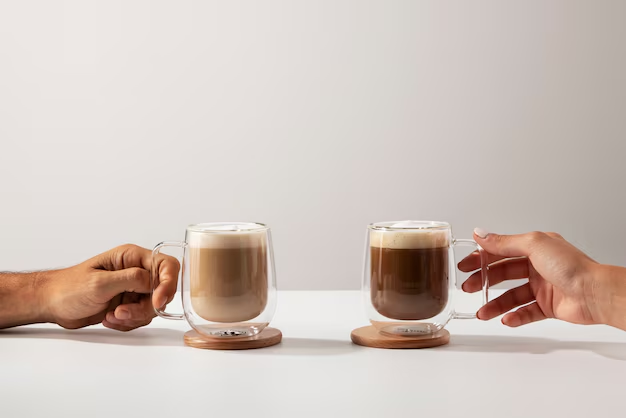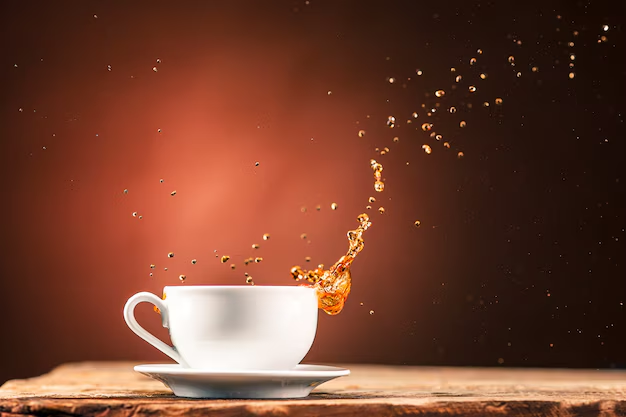Chai tea is a globally beloved beverage, blending aromatic spices with robust tea. Originating from India, its popularity has spread worldwide, thanks to its unique flavor and potential health benefits. Yet, many wonder, does chai tea have caffeine? This is an essential question for those monitoring their caffeine intake. Let’s break it down and uncover the nutritional and caffeine details behind chai tea.
Chai Tea Nutritional Facts
Chai tea is more than just a comforting drink; it’s also packed with potential health benefits. Here’s a breakdown of its primary ingredients and nutritional value:
Key Ingredients
- Black Tea: The base ingredient provides antioxidants like catechins and theanine.
- Spices: Common spices include cinnamon, cardamom, ginger, cloves, and black pepper. These add flavor and possible anti-inflammatory properties.
- Milk: Often used to create a creamy texture, milk adds protein and calcium. Non-dairy options like almond or oat milk can be substituted.
- Sweeteners: Traditional chai uses sugar or honey, adding a touch of sweetness.
Nutritional Overview
- Calories: Depends on preparation; ranges from 60-200 calories per serving.
- Protein: 2-4 grams if milk is included.
- Fat: Low fat unless cream or full-fat milk is used.
- Carbohydrates: Mainly from sweeteners, typically 10-20 grams.
Chai tea is a flavorful, nutrient-dense option for those looking for a warm, invigorating drink.
Does Chai Tea Have Caffeine?
The short answer: yes, chai tea does have caffeine. However, its caffeine content varies based on its preparation.
Traditional Chai Tea
Traditional chai tea is made using black tea, which naturally contains caffeine. A standard serving prepared in the traditional Indian way contains 20-50 mg of caffeine per cup. This level is moderate compared to coffee but may still provide a mild energy boost.
Commercially Prepared Chai
Packaged tea blends or ready-made chai often vary in caffeine content. Commercial chai products may use decaffeinated black tea or other bases like herbal teas. Always check the label for specific caffeine details.
Does Chai Tea Have Caffeine at Starbucks?
Starbucks, a go-to destination for chai lovers, offers a variety of chai-based drinks. Let’s explore the caffeine levels in these popular options.
Chai Tea
Starbucks’ regular chai tea, brewed using a concentrate, contains approximately 40 mg of caffeine per 8-ounce cup. This is lower than most coffee options but enough to provide a subtle pick-me-up.
Chai Tea Latte
The chai tea latte at Starbucks is a fan favorite. This creamy, spiced beverage contains around 95 mg of caffeine per 16-ounce (grande) serving. The caffeine comes from the black tea in the chai concentrate used for this preparation.
Decaffeinated Options
For those avoiding caffeine, Starbucks offers customization. You can request a decaffeinated version, substituting herbal tea or decaf chai concentrate.
Does Chai Tea Latte Have Caffeine?
Yes, it contains caffeine, but the levels depend on how it’s made.
Homemade Chai Lattes
When preparing chai lattes at home, you control the caffeine content. Using regular black tea provides 30-50 mg of caffeine per serving, while decaffeinated black tea reduces this to nearly zero.
Preparation and Variations
Caffeine levels in chai lattes can increase if you brew the tea longer or use more concentrated blends. Adding coffee shots, such as in a “dirty chai latte,” further boosts caffeine content significantly.
To Read: Is Tea Good for Your Heart? Different Teas Effects
How Much Caffeine is in Chai Tea vs. Coffee?
When comparing chai tea to coffee, caffeine content is a key differentiator.

Caffeine Comparison
- Chai Tea: 20-50 mg per cup.
- Coffee: 95-200 mg per cup, depending on the type and brewing method.
Coffee contains significantly more caffeine than chai tea.
Factors Influencing Caffeine
Several factors affect the caffeine content in chai tea:
- Brewing Time: Longer steeping increases caffeine extraction.
- Concentration: Pre-made chai concentrates often have higher caffeine levels than loose-leaf or bagged teas.
- Milk Ratio: Adding milk dilutes the caffeine slightly.
Does Twinings Chai Tea Have Caffeine?
Twinings is a popular brand offering a variety of chai teas. Most of its blends contain caffeine.
Caffeine Levels in Twinings Chai Tea
- Traditional Twinings Chai
A standard cup of Twinings Chai contains approximately 40-50 mg of caffeine, similar to other black tea-based chais. - Decaffeinated Chai Options
Twinings also offers decaffeinated chai tea, which contains minimal caffeine (less than 2 mg per serving). This is a great option for those seeking the flavors of chai without the stimulant effects.
Comparison to Other Brands
Twinings chai tea is comparable to other major brands like Tazo and Bigelow in terms of caffeine content. The primary difference lies in flavor profiles, as each brand uses slightly different spice blends. Always check the label for precise caffeine information.
Is Chai Tea Good for You?
Chai tea offers numerous health benefits, thanks to its unique blend of black tea and spices. But is it good for everyone? Let’s explore its pros and cons.
Health Benefits
- Anti-Inflammatory Properties
Chai tea is rich in spices like ginger, cinnamon, and cloves, all of which have natural anti-inflammatory properties. These spices can help reduce joint pain, improve digestion, and promote overall well-being. - Supports Heart Health
Black tea in chai contains flavonoids, antioxidants that may support heart health by improving cholesterol levels and reducing the risk of heart disease. - Boosts Immunity
Ingredients like cardamom and cloves have antimicrobial properties that may help your body fight infections. - Aids Digestion
Ginger, a key spice in chai, is known to soothe the stomach and aid digestion, making chai a popular choice for those experiencing mild gastrointestinal discomfort.
Potential Drawbacks
- Caffeine Concerns
While chai tea has less caffeine than coffee, its caffeine content can still pose issues for people who are sensitive to it. Overconsumption may lead to restlessness, increased heart rate, or disrupted sleep. - Sugar Levels
Sweetened chai, especially the ones served in cafes, can be high in added sugars. It’s important to opt for unsweetened or lightly sweetened versions if you’re watching your sugar intake.
Chai tea is a nutritious, comforting drink when consumed in moderation. However, it’s not ideal for everyone.
Is Chai Healthier Than Coffee?
When it comes to health benefits, both chai tea and coffee have their strengths. But which one comes out on top?
Nutritional Profiles
- Chai Tea
- Calories: Typically lower, especially when unsweetened or made with low-fat milk.
- Antioxidants: Contains flavonoids from black tea and spices.
- Caffeine: Moderate levels, around 20-50 mg per cup.
- Coffee
- Calories: Black coffee is calorie-free, but added cream and sugar can increase the count significantly.
- Antioxidants: High in polyphenols, which may reduce inflammation and improve brain function.
- Caffeine: Higher levels, often 95-200 mg per cup.
Health Scenarios
- Better for Digestion: Chai tea, with its ginger and spices, is ideal for improving gut health.
- Better for Energy: Coffee is more effective for an immediate energy boost due to its higher caffeine content.
In general, chai tea is a better choice for those seeking a balanced beverage with moderate caffeine and added health benefits from spices.
To Read: Is Black Coffee Good For Weight Loss?
Who Should Not Drink Chai Tea?
Although chai tea has many benefits, it’s not suitable for everyone. Here are groups who may want to limit or avoid it:

Individuals Sensitive to Caffeine
Even though chai tea has less caffeine than coffee, its content can still cause issues for those sensitive to stimulants. Symptoms like jitters, insomnia, or increased heart rate can occur
Pregnant Individuals
Caffeine intake during pregnancy should be limited. While chai tea may fit within safe limits, it’s best to consult a healthcare provider about appropriate consumption levels.
People with Gastrointestinal Issues
Spices like cinnamon and black pepper can irritate the stomach for some people. Those with sensitive digestion may need to avoid spiced teas.
Alternative Suggestions
- Herbal Teas: Caffeine-free options like chamomile or peppermint offer soothing properties.
- Golden Milk: A warm beverage made with turmeric, milk, and no caffeine.
- Decaffeinated Chai: Retains the classic flavor without the stimulating effects.
To Read: Is Green Tea Good for Weight Loss?: A Detailed Guide
FAQs
Is chai tea high in caffeine?
Chai tea contains moderate caffeine levels, generally lower than coffee but higher than herbal teas. The caffeine amount depends on the type and preparation, making it a good option for those seeking a gentle energy boost.
Will chai tea keep me awake?
Chai tea’s caffeine content may help you stay awake by boosting alertness. However, it contains less caffeine than coffee, providing a milder effect. Its blend of spices can also provide a comforting, relaxing sensation.
Can you drink chai tea while pregnant?
Pregnant individuals can consume chai tea in moderation. Its caffeine content is relatively low, but it’s essential to stay within recommended daily caffeine limits. Consult a healthcare provider for personalized advice based on your pregnancy.
Conclusion
So, does chai tea have caffeine? Yes, it does, but the amount varies depending on the preparation and brand. Traditional chai tea contains moderate caffeine levels, making it a gentler alternative to coffee. Whether you enjoy it for its rich flavors, health benefits, or cultural roots, chai tea offers something for everyone. However, those sensitive to caffeine or specific spices should consume it mindfully.
Chai tea is not just a drink; it’s an experience. Whether enjoyed plain, as a latte, or decaffeinated, there’s a chai for every palate.


